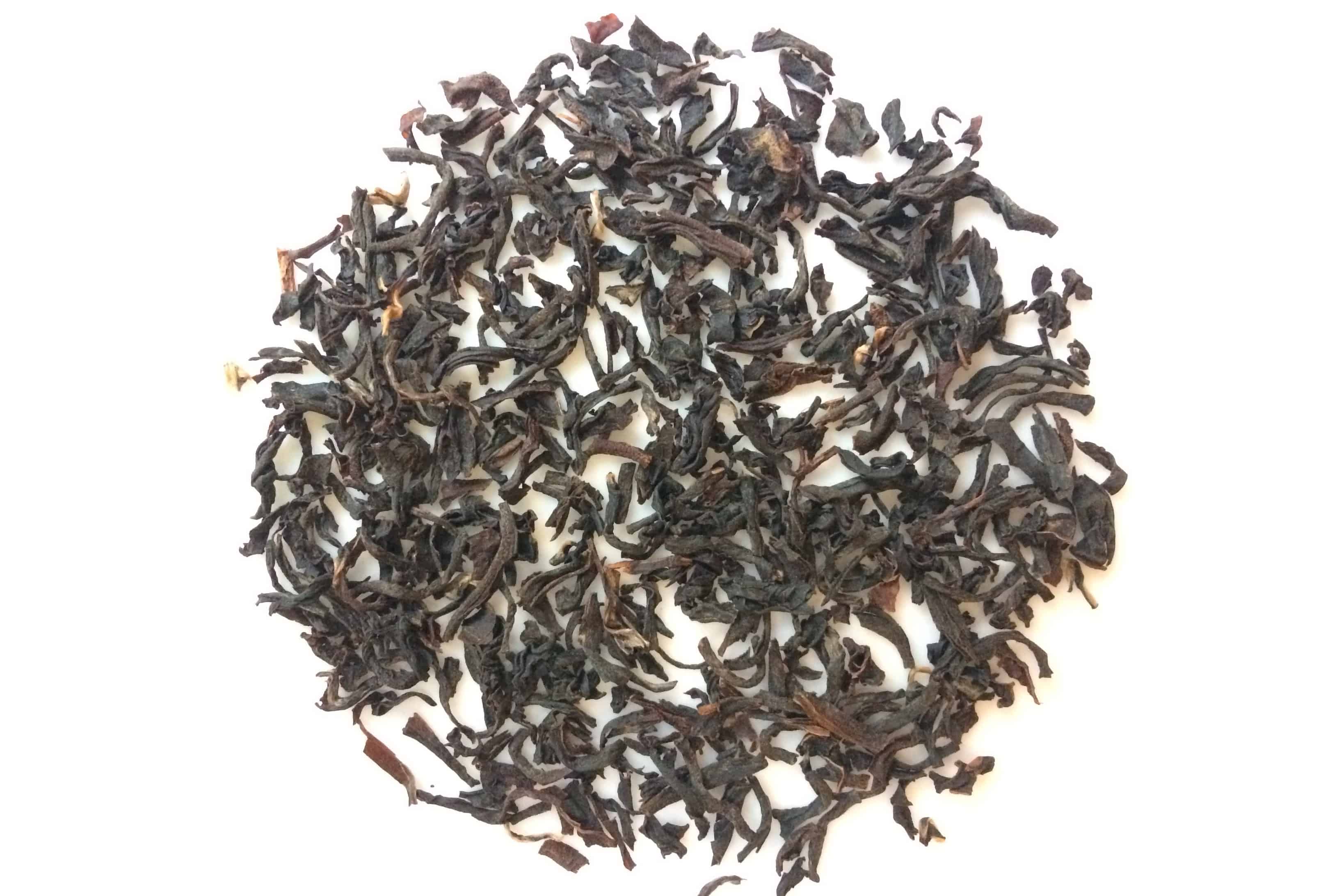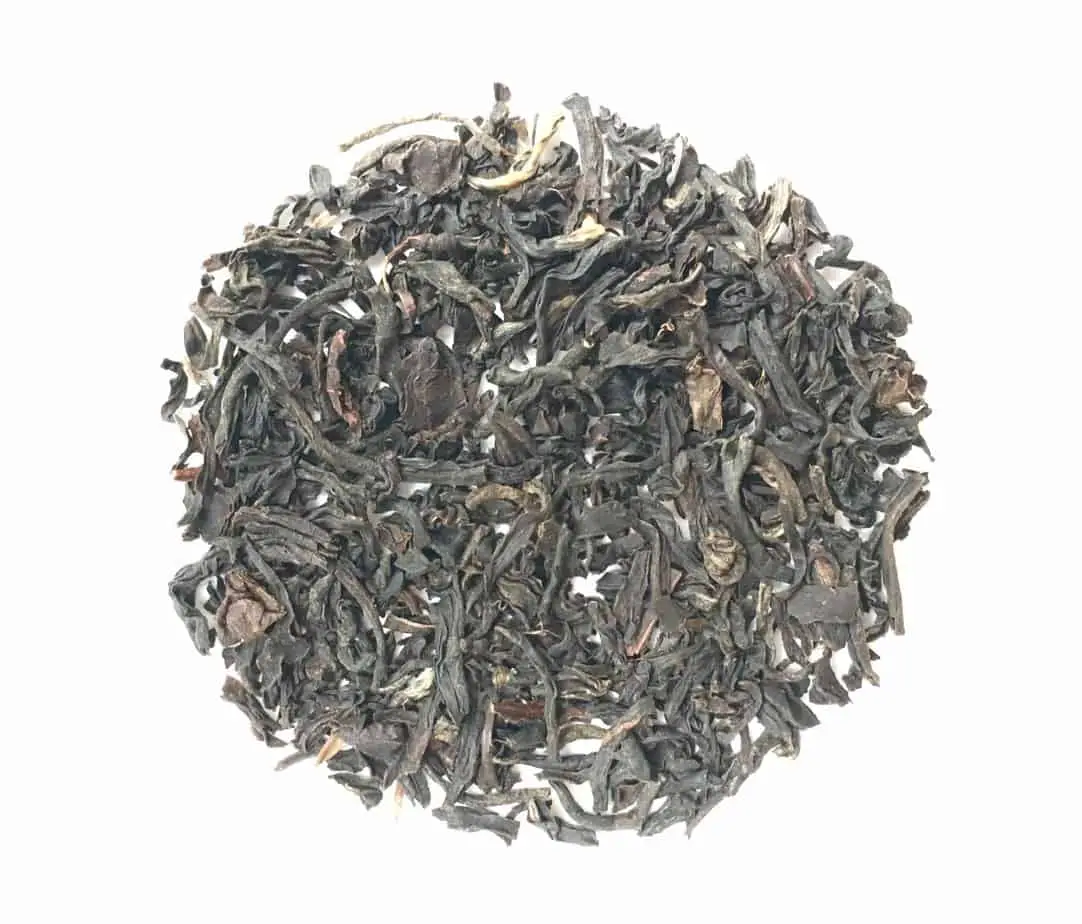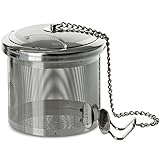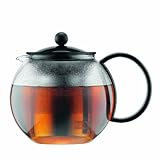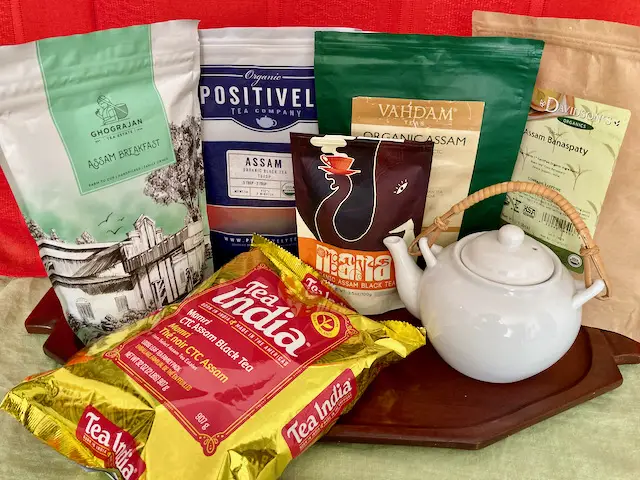
[At no cost to the buyer, we receive a modest commission through the affiliate links below. Thank you!]
Among the world’s great tea regions, Assam, India, is best known for black teas that are malty and strong.
A malty Assam black tea has a lightly caramelized sweetness, similar to the flavor and mouthfeel of roasted nuts, dried fruits, cookies, and pie crust.
A strong Assam has intense flavors that loudly assert themselves. Just one look at the deep red color of Assam tea suggests its power!
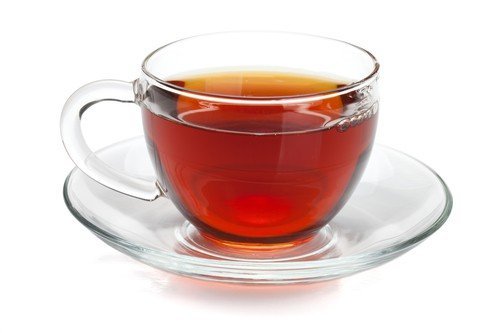
A third quality of Assam black teas, astringency, is not a flavor as much as a feeling. I describe astringency as a dry, retentive sensation like your mouth and tongue selfishly holding all the tea’s goodness rather than letting it wash away. You know astringency when you feel it; it should never be unpleasant!
Together, maltiness, strength, and astringency make Assam black teas excellent when sipped unaltered and superb when paired with baked goods, milk, spicy chai, and kombucha ferments.
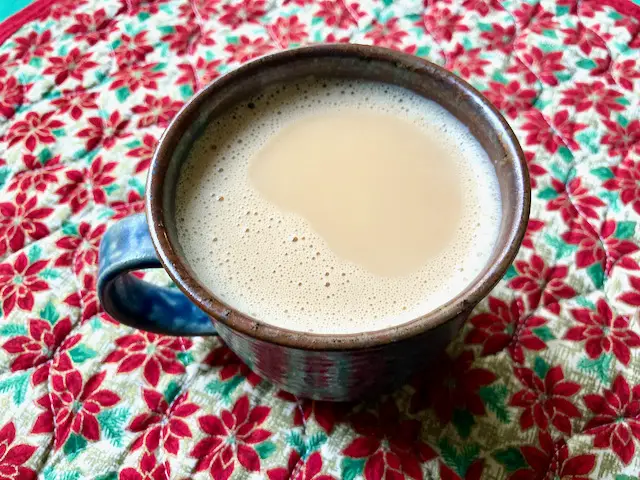
The challenge for tea drinkers is finding the best tea value, and I am here to help with that endeavor! Today, I share a list of the Best Assam Black Teas available to American buyers in 2023.
For the money, Assam teas are probably one of the best bargains in the industry.
How I Chose The Best Assam Black Teas
I explore teas from around the world to improve my craft in tea farming and tea making. Assam black teas are one of my all-time favorites within the mountain of tea I’ve sampled. They are like old friends who stop by daily for good cheer.
As I discover new teas and revisit familiar ones, I make lists of the best and publish them here.
Here are the highlights of the Assam list:
All opinions expressed, unless noted otherwise, are my own. I purchased and reviewed each tea independently of the manufacturer.
Let’s begin our review of the best Assam teas!
#1. Best Overall: Ghograjan Tea Estate “Farm2Cup” Assam Black Tea
One feature valued in today’s tea market is single-estate origin. Single-estate means neither raw tea leaves nor finished tea is blended with products from other tea estates.
The benefit of single-estate origin is accountability: the tea drinker knows which farm to celebrate (or condemn) for the quality of its leaf, the nature of its farming practices, and the strength of its labor relations.
In principle, the single-estate business model establishes a transparent chain of accountability that—one would hope—fosters a better product and leaves behind a better world.
Ghograjan Tea Estate takes single-estate production up a notch. Established in the 1940s, this family-run small business is not just a tea maker but also a tea grower and tea packer. In short, the entire operation, from tea seed to packed tea and all steps in between, is conducted on-site at Ghograjan Tea Estate in Assam.
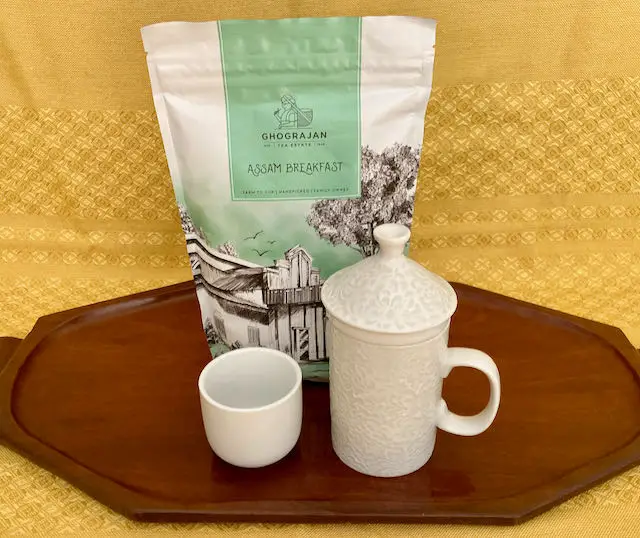
Thus, there are no middlemen involved in the production of this tea. The tea is shipped directly from the farm via a US distributor and then to the tea drinker. Farm2Cup is what the company calls this model of single-estate tea production.
Ghograjan is single-estate to its core.
The Farm2Cup Difference
Does Farm2Cup translate into quality tea? Oh yes!
Ghograjan’s tea is malty, strong, brisk, and clean.
The malty note is prominent and hangs at the front of the mouth for a few savory moments.
And what always surprises me is the absence of bitterness in this tea. Instead, it is strong yet forgiving in that your mouth isn’t overwhelmed by the intense sensory notes.
This is great news because bitter brew is not for everyone.
How To Brew Ghograjan’s Assam Black Tea
Ghograjan’s black tea is made in the cut, tear, curl (CTC) method, which rolls up bits of cut leaf into small pellets. Like a sprinter reaching the finish line quickly, CTC tea reveals its flavor secrets after just one steeping.
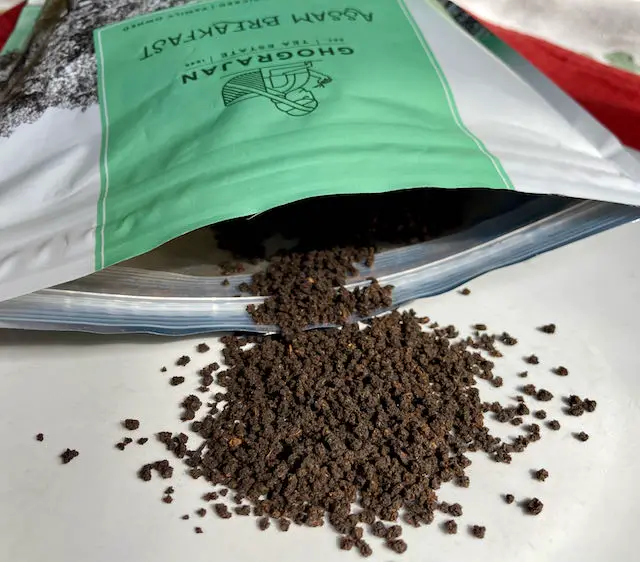
Nevertheless, Ghograjan’s tea is crisp and well-balanced, with a robust, full-bodied profile of Assam’s heartiness.
Over several tea sessions, I settled on a soft steeping of one teaspoon of tea per 8 oz of water brewed at 205°F for three minutes. This soft steep brought out strength while also releasing flavor.
To make a stronger brew, use a little more tea per cup as a first step to finding your Assamese bliss.
Though I did not succumb, I understand the urge to add sweeteners or milk. Sipping this tea is like eating a lightly sweetened cookie you want to chase with milk. Assam teas will do that to a body; follow your own council here.
If Farm2Cup translates into fresh-packed tea, then the crispness of the brew may be explained by the short turn-around time between leaf harvest and the final packing of finished tea. Staleness will be a problem for Ghograjan’s Assam Black Tea.
Tea Summary
- Crisp, hearty, and succinct with a pleasing malty note.
- Available in 8-ounce or 1-pound packets.
- Perhaps too bold for some tastes; reduce the quantity of tea leaves as needed to make a lighter brew.
#2. Best Budget Assam: Tea India CTC Black Tea
Many tea lovers want a Best Budget tea that’s reliably tasty yet respects wallet sizes. Finding such a tea is probably the biggest challenge because low-end teas are usually poor quality and not worth the pittance they cost.
But Assam knows how to make a Best Budget Tea that sips well above its weight! For this challenging category, I chose a CTC black tea from the tea supplier Tea India.
Tea India sources Assam-grown tea leaves and uses the CTC method in Indian factories. It then exports dried teas to the US for blending, packing, and shipping. Their motto is “Born in India & Made in the Americas,” which refers more to the enterprise’s spirit than manufacturing details.
A 32-ounce (0.9 kg) packet of Tea India’s CTC Black Tea is the size of a small pillow! That’s a lot of tea! And it’s sold at half the price per ounce you’ll pay for the Best Overall black tea I reviewed above.
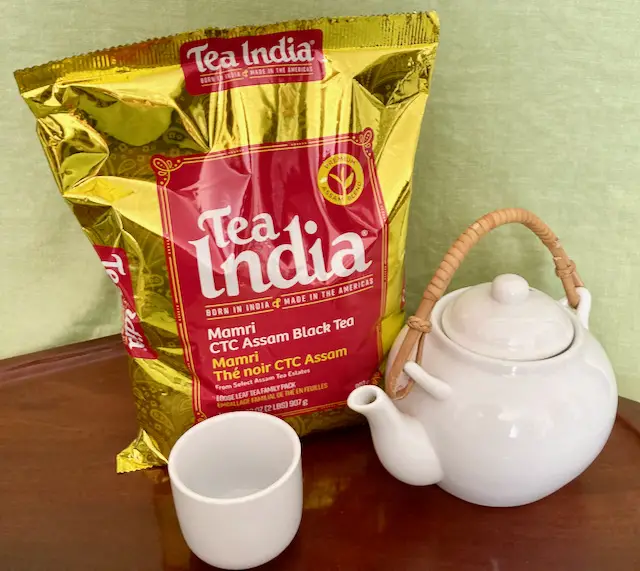
The tea is comforting, warm, and malty, as a good Assam should be. It’s not as crisp and bright as other Assams reviewed here, but it has many uses when budgets are tight.
Those needing an inexpensive tea for a cafe or large dinner party need this black tea because it hits the sweet spot in quality, price, and quantity. It will be great for mixing up many gallons of iced tea, either sweet or unsweet.
You can also use Tea India’s Assam to experiment with kombucha or chai spices and not worry about throwing out a few batches before you get the recipes right. I wouldn’t prefer this tea as the Best Daily Assam–see that category below–but it’s an impressive Budget Tea.
Tea Summary
- A “utility-knife” black tea that’s good for many uses.
- Big packet of tea to supply home or restaurant.
- The packet is not resealable; store in a ziploc bag or airtight tin.
#3. Best Assam Tea for Special Occasions: Vahdam Premium Organic Assam CTC Black Tea
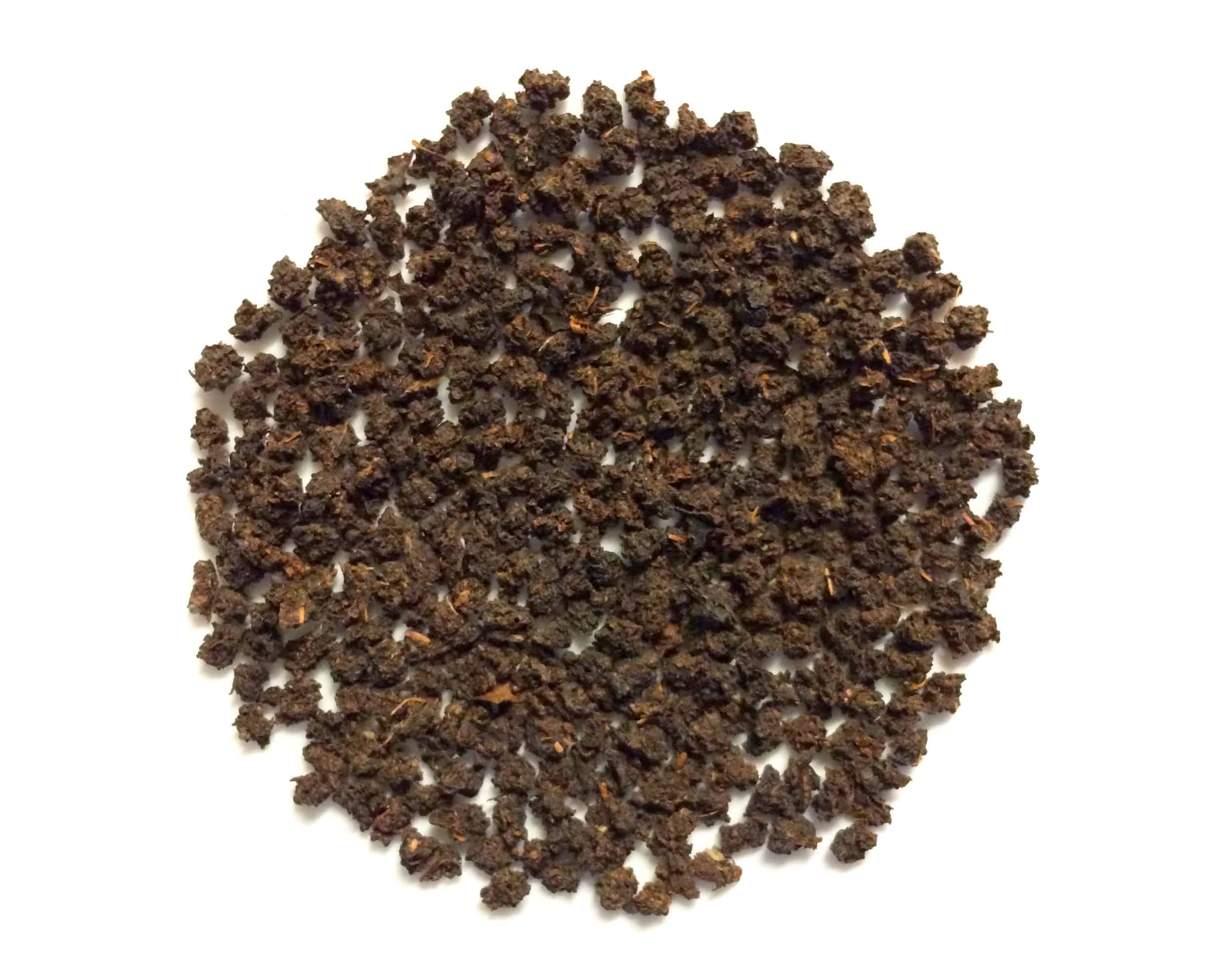
Not all single-estate tea suppliers are also tea farmers.
The India-based company Vahdam Teas does not grow or process tea leaf. Instead, Vahdam purchases teas from each of several estates located in Assam and then contracts with other parties to process the leaf.
Securing single-estate status is thus a matter of careful tracking of leaf from each Assam estate to the finished batch of tea.
After processing, tea is transferred to Vahdam Teas for packing at their state-of-the-art facility in New Delhi. The leaf source within Assam may change from one batch to the next, but Vahdam Teas strives to make each particular batch single-estate in origin.
Vahdam’s delivery goal is to hold finished tea no longer than 72 hours before packing into resealable packets for shipment abroad. You might think that it’s no big deal to adhere to such a tight packing schedule. Be assured, however, that there is probably more than one poor soul losing sleep for the supply chain to New Delhi.
The Freshness Challenge
Does the freshness of tea translate into a fine brew?
Tea drinkers volunteer that Vahdam’s Premium CTC Assam Black Tea has strength and boldness and just enough maltiness to make this a true Assam tea.
The light maltiness may be a result of firing temperature or it could be related to native soils. In any case, the consensus among reviewers is that the tea is well-balanced and has a crisp aroma, indicating freshness.
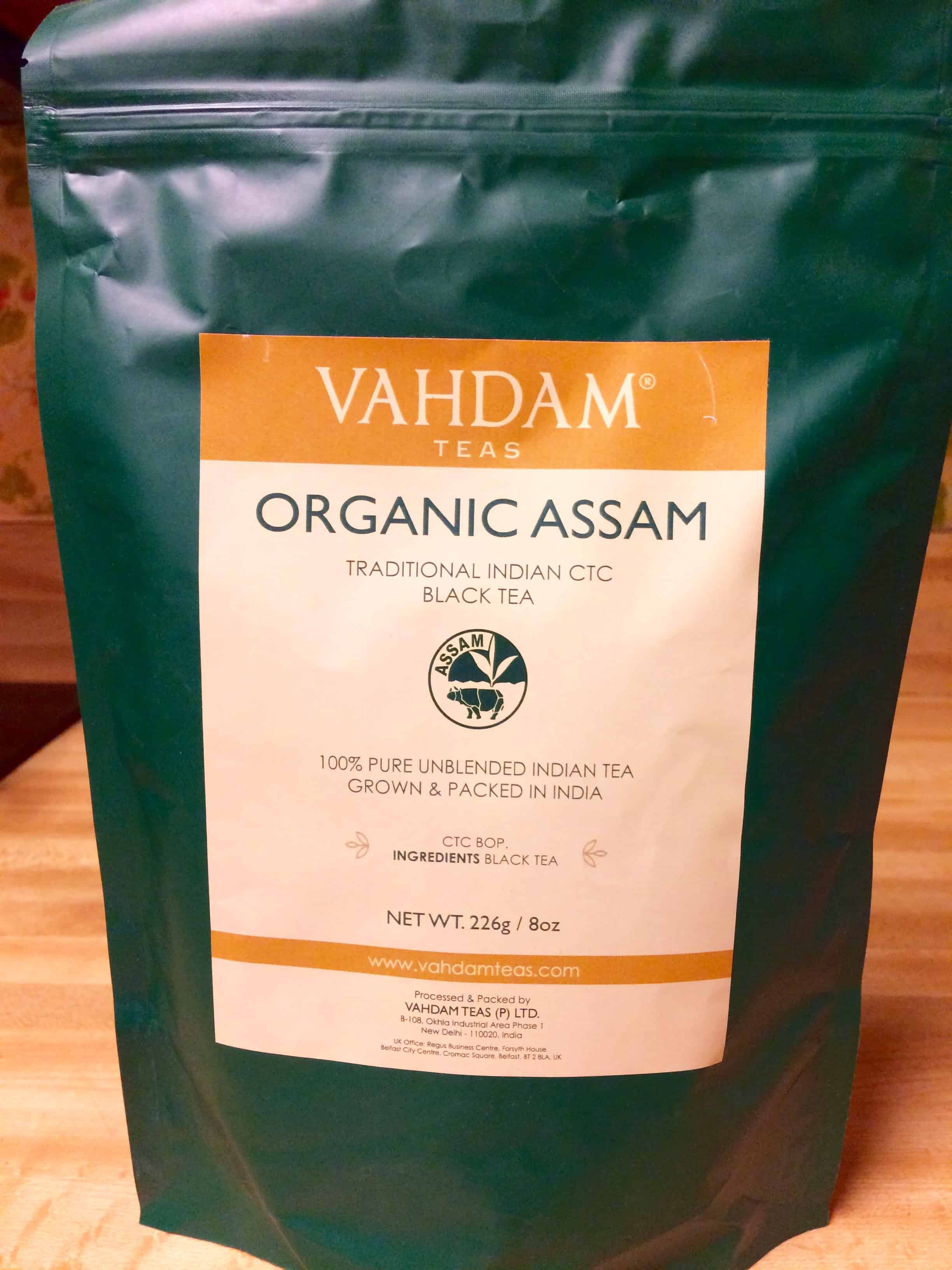
A Tea with Friends: Pour to Impress
Those who do not drink tea regularly can be hard to impress.
This is why I suggest that for social gatherings such as holiday feasts or other special occasions, you brew up a leaf that is flavorful without being too strong.
When I first poured this Assam tea, I immediately detected an aroma that was mild compared to the other black teas that I review here. Mild yet Assam-confident, which is how I would describe the flavor of this fine tea as well.
I also like a soft steep with this CTC: One teaspoon in 205°F water for 3 minutes.
And does it pair well with baked goodies?! Well, to be more specific, I paired it incidentally with breakfast cereal and milk. So I suppose that I did “add” milk and sweetener, if indirectly, to this particular tea. It was a nice pairing, and I think that I now have a friend for that slice of pecan pie waiting patiently in the fridge.
If you’re having a party with baked items, and you don’t mind paying a bit more for the silky smoothness of this tea, then Vahdam’s leaf is a great choice for those times when you want to pour to impress.
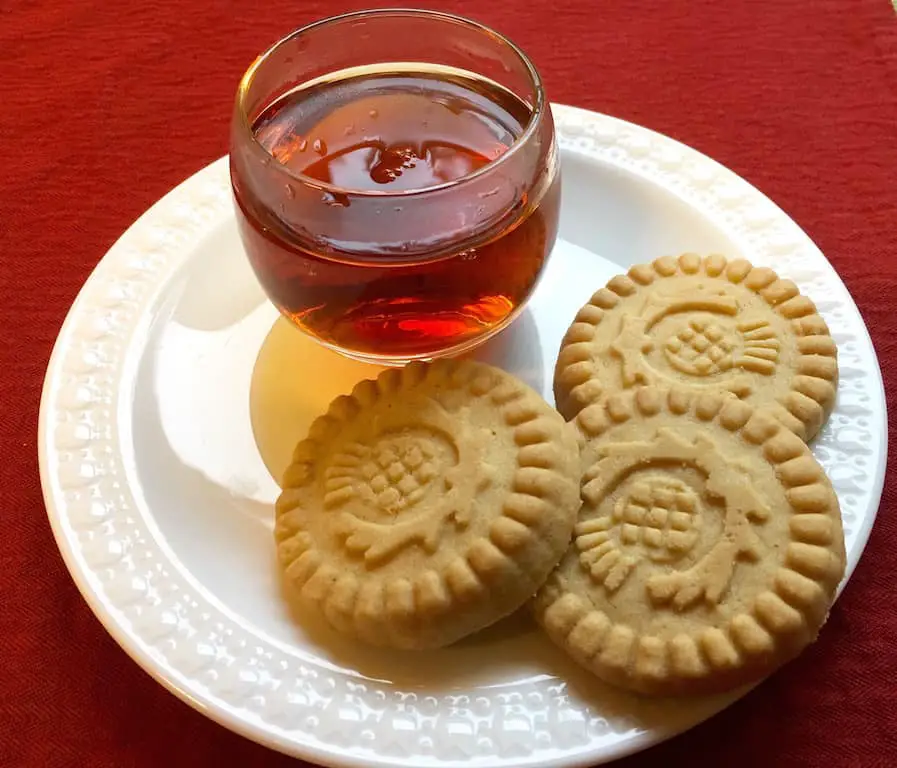
Sourced from Organic Tea Estates
It is noteworthy that suppliers for Vahdam’s Premium Assam CTC Black are certified USDA Organic. Many farms make the case that they are effectively organic in practice, but few can afford to undertake the costly and time-consuming certification process.
If organic matters to you, then you should make comparisons between teas that are officially certified organic and those that are conventionally grown. Vahdam’s offering is a good place to begin your tests.
Tea Summary
- Mild but not meek + good for sharing with friends.
- Great with cookies, cakes, and pastries!
- A bit pricier than most but still reasonable.
#4. Best Organic Assam: Mana Organics Single-Estate Assam Black Tea
You can add a fine Assam black tea from Mana Organics to your comparisons.
Since 2015, this company has managed the USDA-certified organic sections of tea fields at the Chota Tingrai Tea Estate in Upper Assam.
In the field, Mana Organics tea farmers gather natural sources of nitrogen and organic matter, which they compost along with minerals and other nutrients. The finished compost is then spread around the base of each tea plant.
The goal of Mana is to create a closed-loop nutrient cycle whereby organic matter that is produced on the farm—less harvested tea leaf—is eventually returned to the farm.
A lot of labor and dedication is required to close that loop.
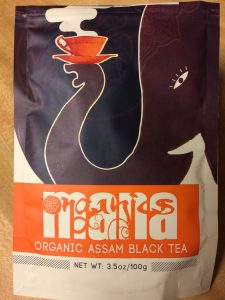
Tea Labor (of Love)
Does all this fieldwork translate into a special tea?
Early in the first sip of Mana Organics Single-Estate Assam, I enjoyed Assam maltiness immediately at the front of the mouth.
At the back, a wash of saliva emerged to suspend the flavors for a bit longer. This was a surprise and welcomed event not duplicated by the other Assams I sampled.
A hard steep of one level tablespoon of whole-leaf tea at 212°F for four minutes brought out the boldness without lingering bitterness. And then, mid-way through the sip, a delicate sweetness balanced the strength.
There was also a slightly earthy note that slipped into the mix.
Tea reviewers agree that the natural sweetness of this leaf makes milk and sugar unnecessary to tame the boldness.
An Assam black tea with malty boldness and honey-sweetness is not typical of teas from this region.
The labors of organic farming may indeed pay off for the Mana Organics Single-Estate Assam Black.
Orthodox, not CTC
Mana’s Assam is not manufactured like the previous two teas. Instead, it is made in the so-called orthodox style, which processes leaves through withering, mechanical rolling, oxidation, and drying.
The product of orthodox manufacturing is short lengths of dry, whole-leaf rather than small pellets. In other words, orthodox is traditional tea making. And because the dried leaves are twisted during rolling, you can enjoy watching them unfurl as you await your precious serving.
Tea Summary
- A surprising sweetness + zero-waste farming practices.
- Excellent mouthfeel, especially at the back end of the sip.
- Special qualities may be lost with spicy chai or fruity kombucha.
#5. Best Daily Assam: Positively Tea Company Organic Assam Black Tea
You won’t need your fine-mesh strainer for this Assam black tea. Positively Tea’s Organic Assam Black has large, ample leaves which is why it is classified as Flowery Orange Pekoe (FOP).
A full leaf also indicates that orthodox methods, rather than CTC, were used to process the tea. The distinction is important because orthodox teas tend to be slower to the finish line than sprinting CTC teas. You must be patient with the whole leaf as it unfolds in the water and slowly releases its flavor compounds.
A slow, loping reveal of flavors can explain why it took me several tea sessions to find the best steeping recipe. I settled on a level tablespoon of tea steeped in 8 oz. of water for 3.5 minutes at 212°F. This is the spot where I found this tea’s body and strength along with Assam maltiness. Less leaf steeped at a lower temperature just doesn’t pack any punch and then what’s the point of drinking Assam?
The strength and stoutness of this tea are also noted by many reviewers. They also found that this organic Assam is hearty and has just a hint of smokiness. It took a few sips to notice, but I also enjoyed a subtle smokey note.
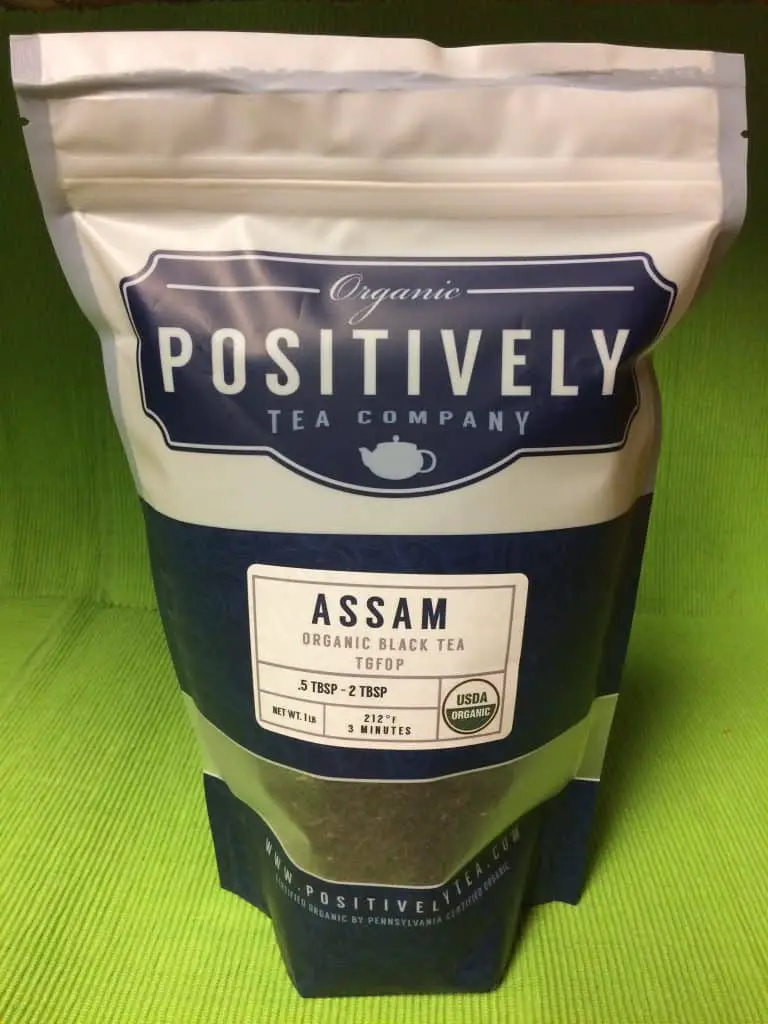
Economize Assam Tea Purchases
If you’re looking for a good tea deal, buy in bulk. Positively Tea offers a one-pound bag that works out to a very affordable price per cup. A tea that is both pleasant and inexpensive could be your best bet as a daily tea.
Tea Summary
- Stout brew with a pleasant hint of smokiness + a pleasing price.
- Nice baked maltiness + great daily tea.
- Stoutness is not for everyone.
#6. Best Assam for Chai or Kombucha: Davidson’s Banaspaty Estate Organic Assam Black Tea
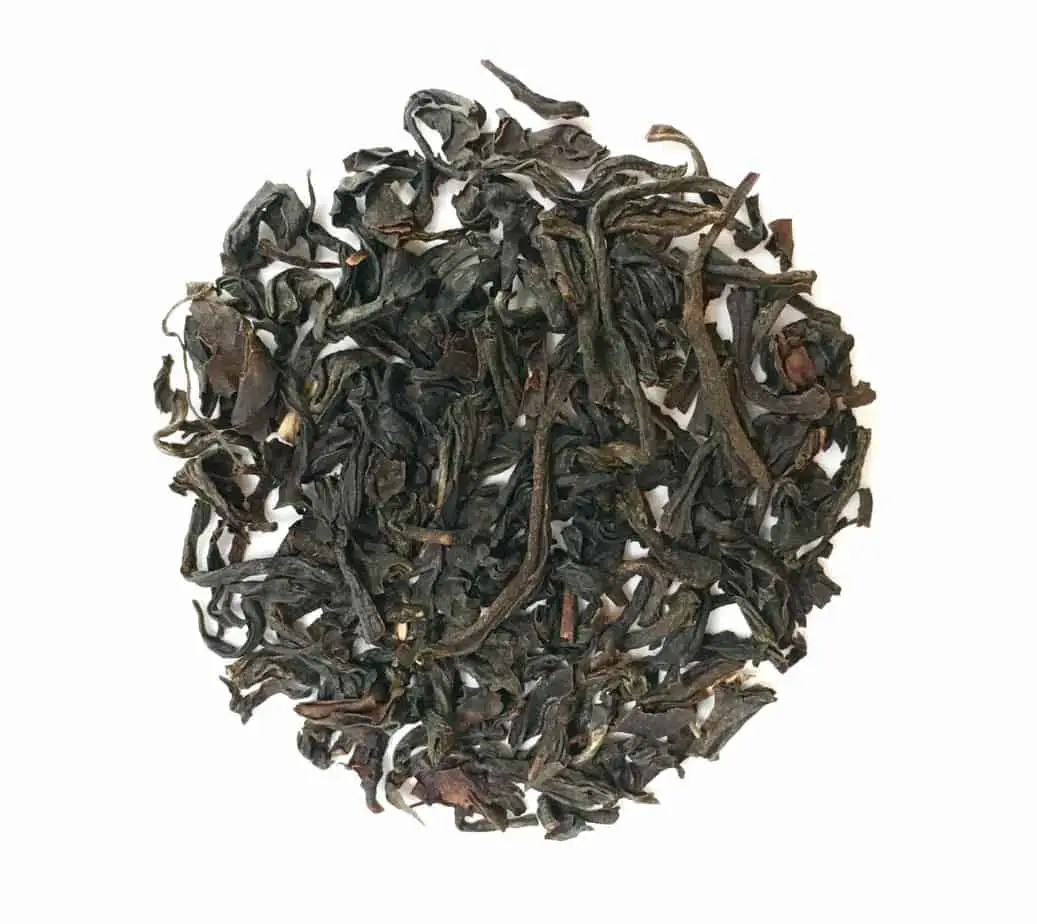
Many Assam black teas perform well in spicy or fruity concoctions such as chai or kombucha.
But you have to be careful. You don’t want an Assam that has so much fight that it knocks out the spices or scares the SCOBY into hiding.
An Assam with characteristic maltiness but not too much astringency is a good match for these lively mixes.
Many tea aficionados find that the full-bodied but mellow character of Davidson’s Banaspaty Estate Organic Assam Black Tea adds body to chai and kombucha without overwhelming the blend.
You may also try this tea iced and sweetened with your favorite sugary weakness.
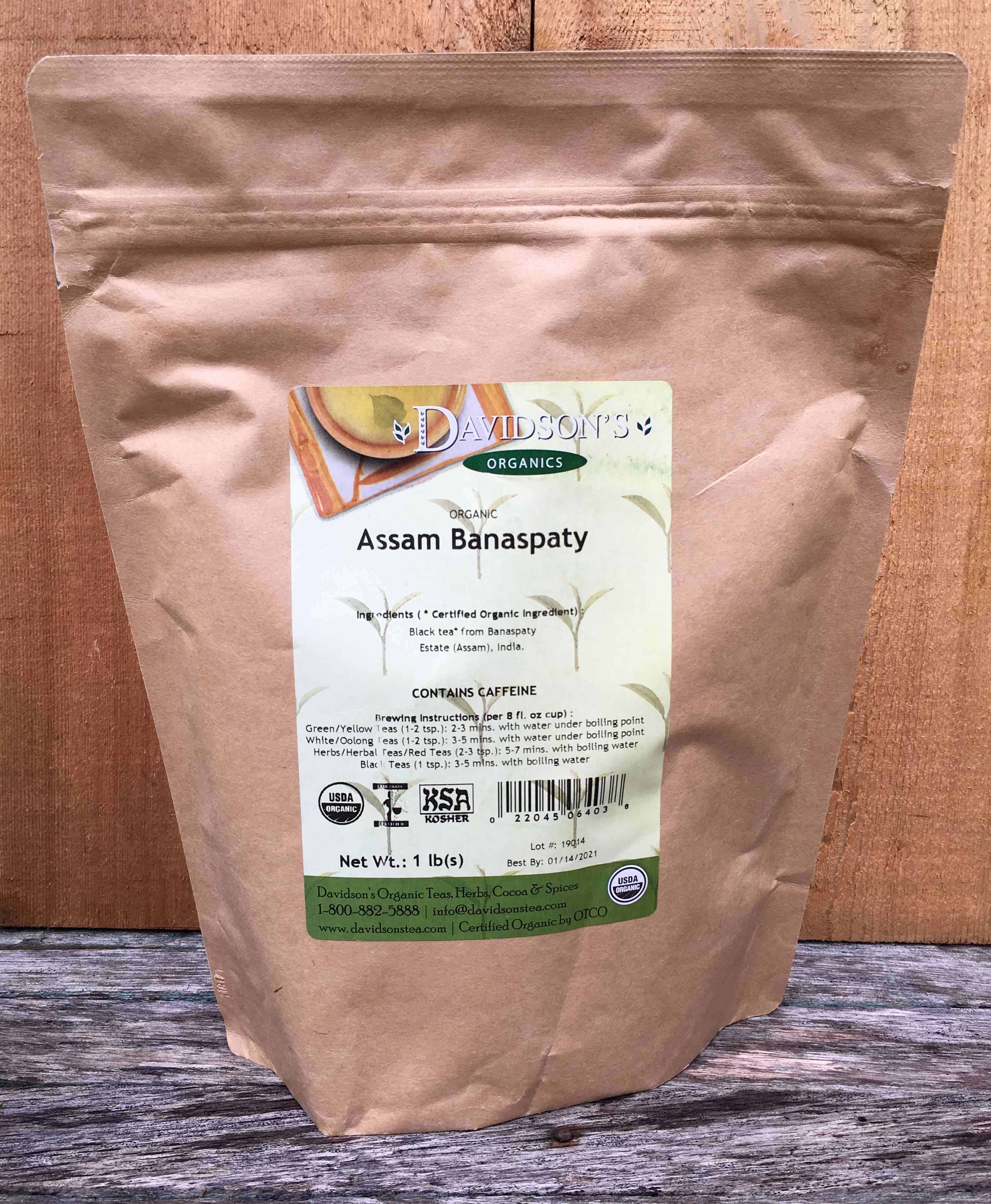
Davidson’s Assam is USDA organic, Fair Trade, and sourced solely from Banaspaty Estate, which has grown tea for decades in the hot, humid climate of Assam. It is a very popular leaf for tea retailers all over the world which indicates confidence in the tea producer’s consistent standards.
Tea summary
- Great for chai and kombucha + organic + Fair Trade.
- Orthodox tea with balanced flavor + a good alternative as a daily Assam.
- No downsides that I can discover.
Putting it together: the Best Assam teas of the year
The teas we review here have a lot to offer, but you may want something particular in your cup. To summarize our recommendations, keep these points in mind:
- If you want a strong, hearty cup of tea that is direct from the estate and makes you think you’re standing in the middle of an Assam tea field, go with Ghograjan Tea Estate Assam CTC Black Tea. If out of stock, try this alternative Assam Black Tea.
- When you’re on a tight budget but don’t want to sacrifice quality, try a black Assam tea by Tea India.
- If, however, you prefer your Assam to be on the lighter side of robust, on the softer side of astringent, and the more gentle edge of malty, then go with Vahdam’s Organic Assam CTC Black Tea. It’s also good for sharing with friends on special occasions.
- If a USDA organic tea with natural sweetness is your fancy, Mana Organics Single-Estate Assam Black Tea has the sweetness to round out its maltiness and strength.
- Those looking for an affordable daily Assam black, a tea that’s also good for Assam milk tea with sugar, then you can do no better than the robust leaf of Positively Tea Company’s Organic Assam Black Tea.
- And finally, you can have your chai or kombucha nicely balanced (and perfectly caffeinated) with Davidson’s Banaspaty Organic Assam Black Tea.
- And if Assam black tea isn’t your fancy, then check our review of other types of fine black teas.
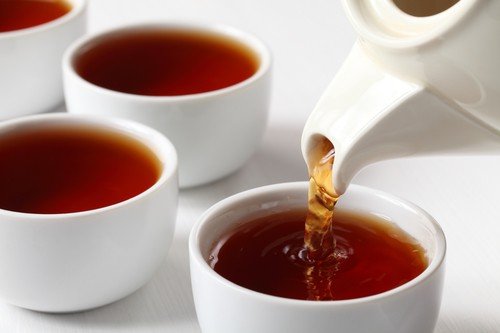
FAQs
What Teaware Do I Need for Assam Black Tea?
Each tea we reviewed here is loose-leaf and, therefore, not constrained in teabags.
Use a fine-mesh tea strainer or infuser for CTC and whole-leaf (i.e., orthodox) teas to get the best out of your brew. The leaf needs to unfurl and expand in the hot water, so try to get the largest strainer-infuser that you can fit in your teapot, pitcher, or cup.
We like the stainless steel FORLIFE Capsule Infuser that holds up to a cup of loose tea or spices. The lid is easy to remove, and the capsule is a snap to clean. Use the attached hook and chain to make it easier to withdraw the capsule from the vessel.
- Large infuser pod allows tea to expand fully and bringing out more flavor and aroma
- Use your favorite loose tea to make tea or iced tea; Great for large pot
- It can be also used as an herb and spice infuser, perfect for adding extra flavor to various ranging from soup, broth, apple cider and wine
- Use this infuser to replace spice bag or bouquet garni bag
- Filled with spice and fruits to make hot spiced cider or mulled wine
Or if you want an infuser built-in to the teapot, then try the Bodum Assam Tea Press. There’s a lot of room in the stainless steel capsule for leaf expansion, and the plunger mechanism effortlessly separates the liquor from the leaf. Just don’t press too hard, or you may ruin your tea for the next steeping.
- Brews tea at preferred strength without a need to remove the infuser
- Heat resistant borosilicate glass, stainless steel lid, strainer and plunger
- Patented system stops brewing when tea is plunged so tea is not bitter
- 34 oz. capacity
- All parts dishwasher safe
What’s Special About Assam?
One vital feature of Assam is its climate.
In particular, it is very warm, with many days of the year reaching above 90℉ (32℃). High ambient temperatures contribute in part to the bold character of Assam teas. To tame the boldness caused by exposure to heat and sun—and to shelter tea workers—many Assam growers plant shade trees throughout the vast tea fields.
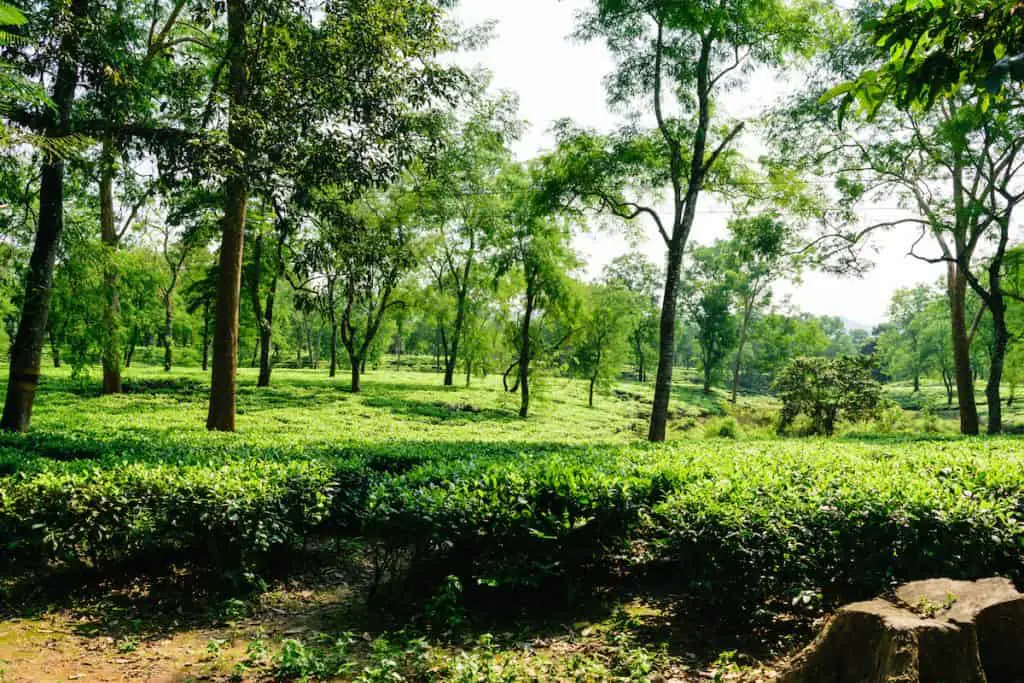
A second feature is Assam’s spirit of technological innovation. For example, 19th-century tea growers, working closely with British horticulturalists, discovered that hybrids of local and imported Camellia sinensis tea plants were extremely productive and made a quality cup of tea. Many cultivated varieties of tea grown around the world today are, in fact, descendants of hybrid stock from Assam.
Around the same time period, Assam tea factories introduced key innovations that reduced the human labor required to process large quantities of tea.
These two developments, coupled with strong market demand, now rank Assam among the top tea-producing regions in the world.
Mike grows and crafts tea in North Florida, USA. He has advanced degrees in biology, and has undertaken coursework in manufacturing Camellia sinensis teas. Mike is a member of the US League of Tea Growers (USLTG) and has presented invited talks on tea growing. Send him a note through our Contact Page if you'd like to talk about tea.
